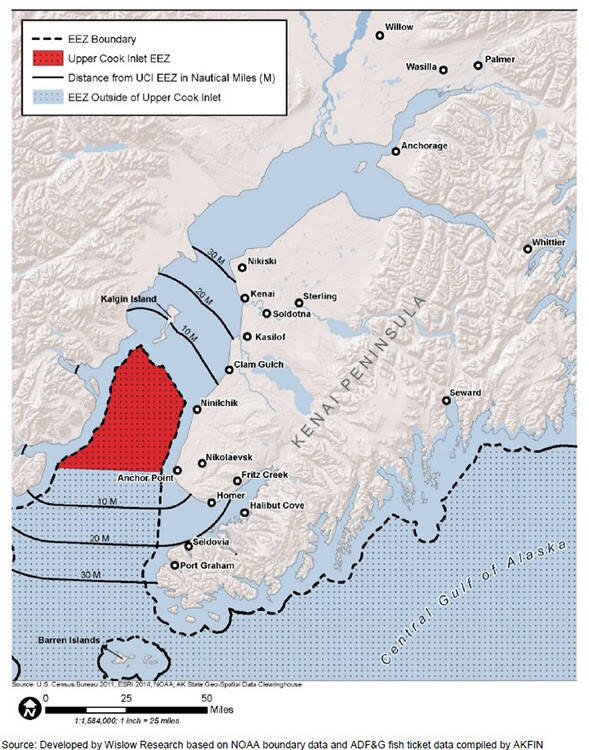The State of Alaska has “significant concerns” with proposed federal management of the Cook Inlet Exclusive Economic Zone, according to a letter addressed to the National Marine Fisheries Service.
The letter is signed by Department of Fish and Game Commissioner Doug Vincent-Lang. He writes that he is submitting on behalf of the state in response to a request for comment by the National Oceanic and Atmospheric Administration Fisheries on a proposed rule that would implement federal management on commercial and recreational salmon fishing in the Cook Inlet Exclusive Economic Zone — which previously has been subject to state regulation.
Public comment on the proposal, Amendment 16, was accepted by the federal agency until Dec. 18 — the letter is dated Dec. 15 and is included in the documents for the State Board of Fisheries upcoming meeting on Upper Cook Inlet Finfish, scheduled for Feb. 23 to March 6 in Anchorage. Discussion of the proposed federal management plan is set for the first day of the meeting.
According to information published by NOAA Fisheries in October, the proposed change would implement new requirements for commercial drift gillnet vessels in the zone, which runs south from Kalgin Island to around Anchor Point. Commercial fishing would be permitted Mondays and Thursdays from 7 a.m. to 7 p.m. “beginning on or after June 19” until total allowable catch is taken or Aug. 15.
The publication says that commercial fishing vessels would need a federal permit, would maintain a fishing logbook, and would have a monitoring system installed onboard. The proposed amendment says the North Pacific Fishery Management Council will “work with the State to coordinate management of State and Federal salmon fisheries harvesting the same stocks to the extent practicable to avoid overfishing and minimize disruption to all Cook Inlet salmon harvesters.”
The letter describes issues the state has with the proposed management program.
“It conflicts with State conservation and management measures that are intended to protect weak stocks and achieve allocation policies established by the Alaska Board of Fisheries,” the letter reads. “The proposed Federal program utilizes tools not developed for salmon management, abandons long-standing management practices of the State for conservation and allocation purposes and places the burden of conservation entirely on the State if pre-season catch limits are over-forecasted.”
Targeting the proposed implementation of total allowable catch limits for different stocks, the letter says that “decades of experience” support that the Cook Inlet drift gillnet fishery should be managed for in-season run strength to prevent over-harvest of weak stocks. The department writes that such a strategy “could jeopardize” sustainability and result in overfishing if pre-season forecasts don’t materialize.
“This could result in failure to meet escapement goals, new Stock of Concern designations, and unfair shifts in burden of conservation restrictions to individuals and businesses that do not participate in the Federal fishery,” the letter reads.
The department also says that it “cannot commit” to providing timely forecasts to accommodate the federal process.
The proposed season closure date of Aug. 15 for the federal fishery is also targeted in the letter. They write that the state fisheries use a framework to evaluate any possible opening for the drift fishery based on run strength information — they say the federal proposal would allow for two pre-determined openings per week regardless of state management.
Despite those concerns, the department writes that they support some elements of the proposal, like the “relatively limited” measures for recreational fishing, prohibitions on fishing in both the state and federal fisheries in one day and monitoring requirements.
The letter closes by saying that the state will not cooperate with the federal management if their requirements diverge from state management plans — saying the department cannot work contrary to state regulation.
To view the full letter, visit adfg.alaska.gov and find the Upper Cook Inlet Finfish Meeting Information under “Regulations.”
Reach reporter Jake Dye at jacob.dye@peninsulaclarion.com.

